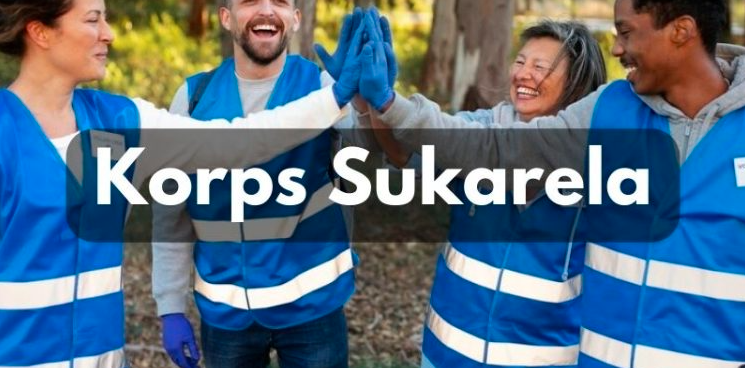Introduction
The term “Korps Sukarela” translates to “Volunteer Corps” in English and represents a significant movement in various countries around the world. This article provides a comprehensive overview of Korps Sukarela, delving into its origins, roles, and impact on society. By focusing on a keyword-driven approach, we aim to deliver an in-depth resource that surpasses existing information online and ranks highly in search engine results.
The Origins of Korps Sukarela
Historical Background
The concept of Korps Sukarela has its roots in the early 20th century, during periods of national crises such as wars and natural disasters. The idea was to mobilize ordinary citizens to support their communities and nations through voluntary service. These early formations often involved diverse groups of people united by a common goal: to serve and protect their country in times of need.
Evolution Over Time
Over the decades, Korps Sukarela evolved from ad-hoc groups into more structured organizations. These corps adapted to the changing needs of society, incorporating more specialized training and expanding their roles beyond mere emergency response. The modern Korps Sukarela often includes medical personnel, engineers, logistics experts, and more, reflecting the increasing complexity of modern crises.
Structure and Organization
Hierarchical Structure
Korps Sukarela typically operates under a hierarchical structure that ensures efficiency and coordination. At the top level, there are usually national or regional headquarters responsible for overall strategy and resource allocation. Below them, local units carry out operations, report progress, and provide feedback to improve future responses.
Volunteer Recruitment and Training
Recruitment for Korps Sukarela is often a rigorous process, aimed at ensuring volunteers are capable and committed. Training programs are comprehensive, covering areas such as first aid, disaster response, communication, and leadership. This thorough preparation is crucial for effective performance in high-pressure situations.
Roles and Responsibilities
Disaster Response
One of the primary functions of Korps Sukarela is disaster response. Volunteers are often first on the scene following natural disasters such as earthquakes, floods, and hurricanes. Their responsibilities include search and rescue operations, providing medical care, distributing supplies, and assisting with evacuations.
Community Services
Beyond emergency response, Korps Sukarela also plays a vital role in everyday community services. These can range from organizing blood donation drives, participating in public health campaigns, to supporting local events and initiatives. This continuous engagement helps build stronger, more resilient communities.
Environmental Protection
In recent years, many Korps Sukarela units have expanded their focus to include environmental protection. Activities in this domain include reforestation projects, wildlife conservation efforts, and public education on environmental issues. This proactive approach aims to mitigate future disasters and promote sustainable practices.
Impact on Society
Enhancing Social Cohesion
Korps Sukarela fosters a sense of unity and purpose among its members and the broader community. By working together towards common goals, volunteers and beneficiaries alike experience strengthened social bonds and an enhanced sense of collective responsibility.
Developing Skills and Leadership
Participation in Korps Sukarela provides volunteers with valuable skills and leadership experience. These competencies are not only beneficial for their voluntary work but also enhance their employability and personal development. The training and experiences gained often lead to improved problem-solving abilities, communication skills, and teamwork.
Economic Contributions
While primarily a voluntary initiative, Korps Sukarela indirectly contributes to the economy. By providing immediate relief and support during disasters, they help mitigate economic losses. Additionally, the skills and experience gained by volunteers often translate into higher productivity and innovation in their professional lives.
Case Studies of Korps Sukarela in Action
Indonesia: A Leading Example
Indonesia has one of the most active and well-organized Korps Sukarela networks in the world. The Indonesian Red Cross (Palang Merah Indonesia) operates a vast volunteer corps that plays a critical role in disaster response and community health initiatives. During the 2004 Indian Ocean Tsunami, Indonesian volunteers were crucial in providing immediate relief and long-term recovery support.
United States: Community Emergency Response Teams (CERT)
While not always labeled as Korps Sukarela, the United States has similar structures, such as the Community Emergency Response Teams (CERT). These teams are composed of trained volunteers who assist in local disaster preparedness and response. The CERT program exemplifies how volunteer corps can be effectively integrated into national emergency management systems.
Challenges Faced by Korps Sukarela
Funding and Resources
One of the significant challenges for Korps Sukarela is securing adequate funding and resources. Despite their critical role, these organizations often rely on donations and government support, which can be inconsistent. Ensuring sustainable funding is essential for maintaining readiness and expanding capabilities.
Volunteer Retention and Motivation
Keeping volunteers engaged and motivated over the long term can be challenging. Factors such as burnout, competing personal commitments, and a lack of recognition can lead to high turnover rates. Effective volunteer management strategies, including regular training, support systems, and recognition programs, are vital to address these issues.
Coordination and Integration
Coordinating efforts among diverse volunteer groups and integrating them with professional emergency services can be complex. Effective communication, standardized procedures, and joint training exercises are essential to ensure seamless cooperation during actual emergencies.
The Future of Korps Sukarela
Technological Integration
The future of Korps Sukarela will likely see increased integration of technology. Tools such as geographic information systems (GIS), drones, and mobile applications can enhance the efficiency and effectiveness of volunteer operations. For example, real-time data sharing and communication platforms can improve coordination and situational awareness.
Expanding Roles and Capacities
As the scope of global challenges broadens, so too will the roles and capacities of Korps Sukarela. Emerging areas such as cybersecurity, climate change mitigation, and pandemic response will require new skills and approaches. Investing in continuous training and adapting to evolving needs will be crucial for future readiness.
Strengthening Global Networks
Building stronger global networks among volunteer corps can facilitate the sharing of best practices, resources, and support. International collaborations and partnerships can enhance the capacity of Korps Sukarela to respond to transnational crises and promote a global culture of volunteerism.
Conclusion
Korps Sukarela represents a vital component of national and global efforts to address emergencies, support communities, and promote social cohesion. By understanding its history, structure, roles, and challenges, we can better appreciate the value of these volunteer corps and the importance of supporting their continued development. As we look to the future, embracing technological advancements, expanding capacities, and fostering global cooperation will ensure that Korps Sukarela remains a cornerstone of resilience and solidarity in the face of adversity.
This comprehensive exploration of Korps Sukarela aims to provide an informative resource that not only educates but also inspires further engagement and support for volunteer corps worldwide. By highlighting the crucial role these volunteers play, we hope to encourage more individuals to join their ranks and contribute to a more resilient and compassionate world.
FAQs About Korps Sukarela
What kind of training do Korps Sukarela volunteers receive?
Volunteers in Korps Sukarela receive extensive training that includes:
- First Aid and Medical Training: Basic to advanced medical skills to provide immediate care during emergencies.
- Disaster Response Training: Techniques for search and rescue, evacuation procedures, and crisis management.
- Communication Skills: Effective communication strategies for coordinating efforts and providing clear instructions.
- Leadership and Teamwork: Building leadership qualities and the ability to work cohesively in teams.
What impact does Korps Sukarela have on society?
Korps Sukarela has a significant impact on society by:
- Enhancing Social Cohesion: Promoting unity and a sense of collective responsibility among volunteers and communities.
- Developing Skills and Leadership: Providing volunteers with valuable skills that enhance their personal and professional development.
- Economic Contributions: Mitigating economic losses during disasters and contributing to higher productivity through skilled volunteerism.
Can anyone join Korps Sukarela?
While many Korps Sukarela units are open to a wide range of volunteers, they typically require individuals to meet certain criteria and complete specific training programs. This ensures that all members are adequately prepared and capable of handling the demands of their roles.



